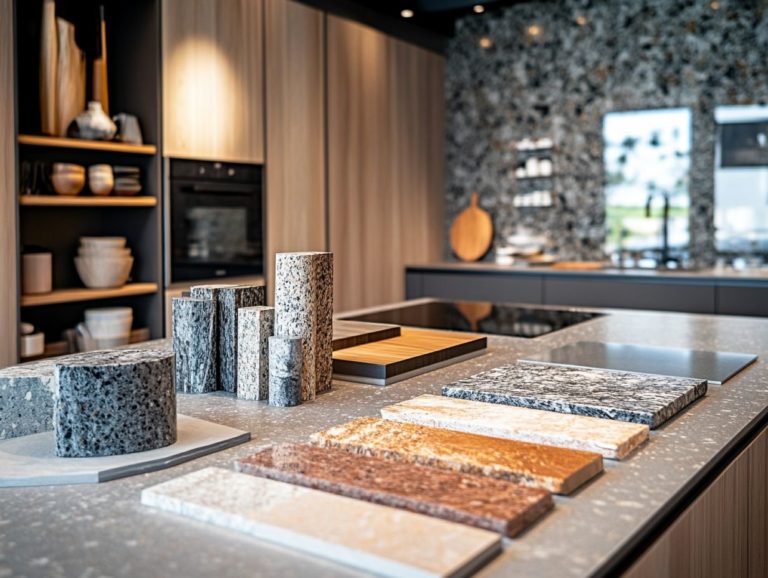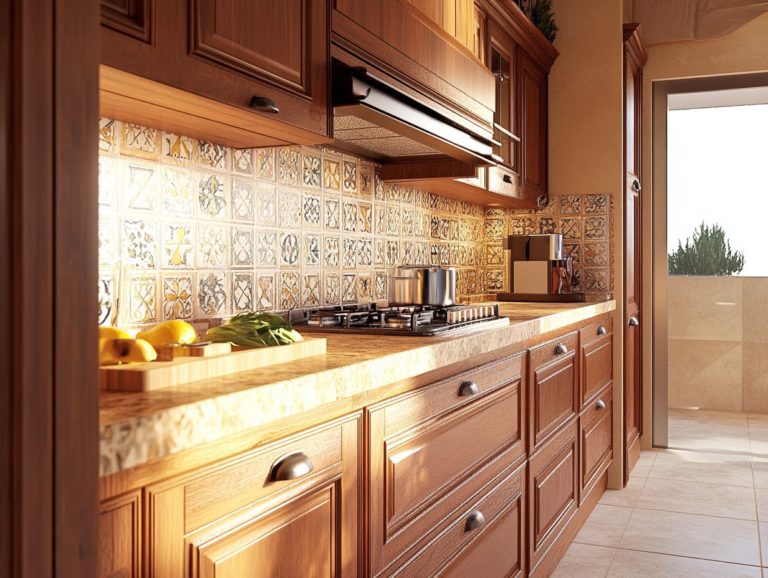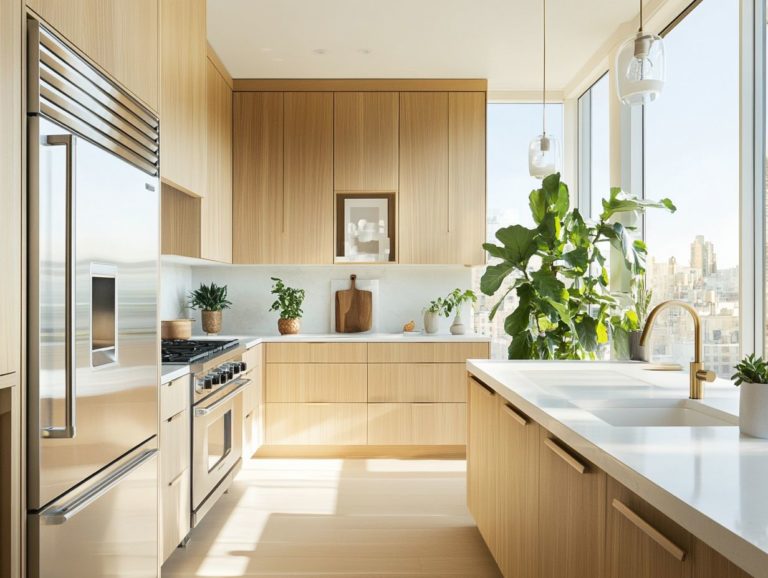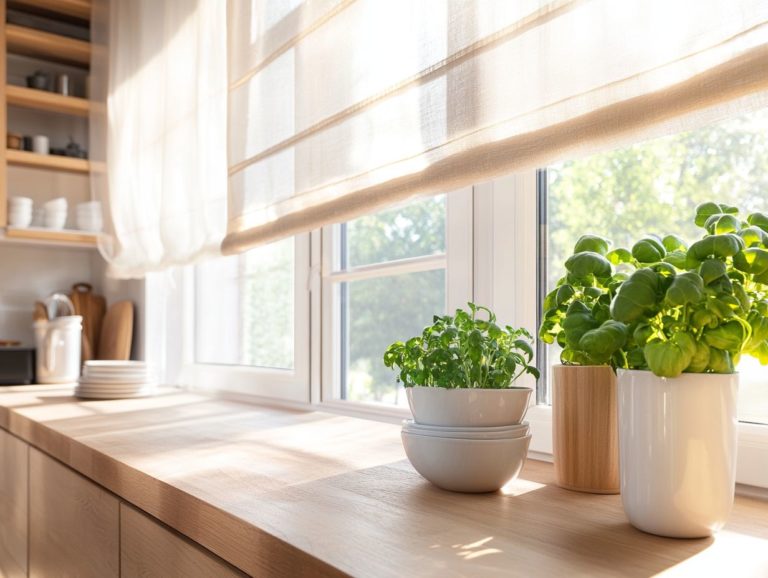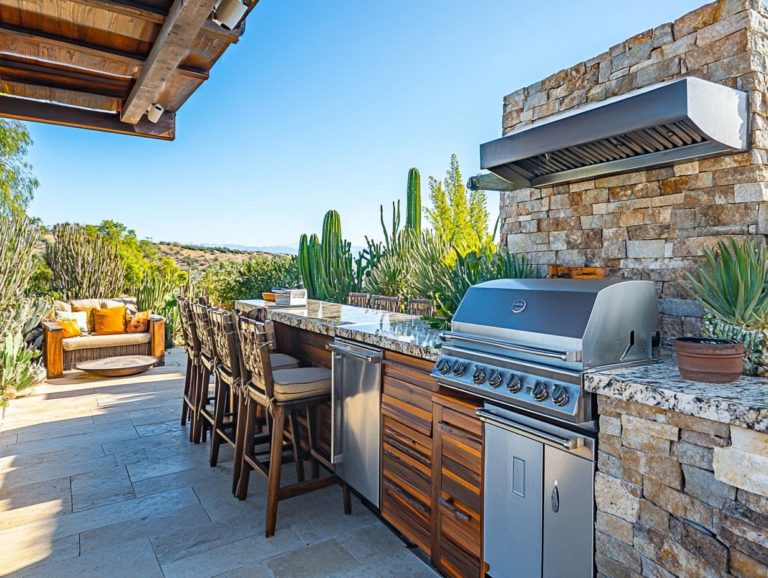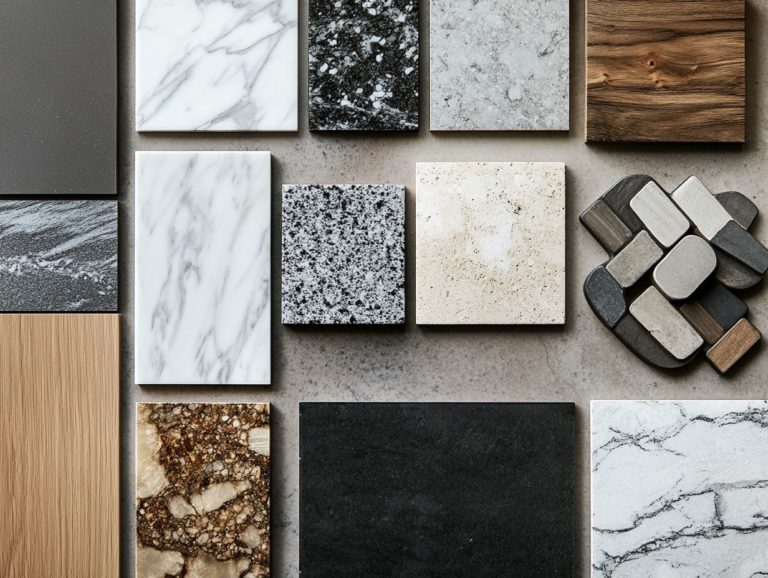Choosing the Right Material for Your Kitchen Counter
Designing your dream kitchen starts with choosing the right countertop material. This choice is vital!
With many options available, each has its own benefits and drawbacks. Consider factors like budget, durability, style, and maintenance.
This guide explores popular countertop materials like granite, quartz, and butcher block. We’ll compare their advantages and disadvantages.
We’ll also cover installation considerations so you can make a choice that aligns with your kitchen’s style and function.
Contents
- Key Takeaways:
- Factors to Consider Before Choosing a Kitchen Counter Material
- Types of Kitchen Counter Materials
- Comparing the Pros and Cons of Each Material
- Factors to Keep in Mind During Installation
- Frequently Asked Questions
- What factors should I consider when choosing the right material for my kitchen counter?
- What popular materials are available for kitchen counters?
- Is one material better than others in terms of durability?
- How can I determine the cost of materials for my kitchen counter?
- Are there any eco-friendly options for kitchen counter materials?
- What maintenance is required for different materials?
Key Takeaways:
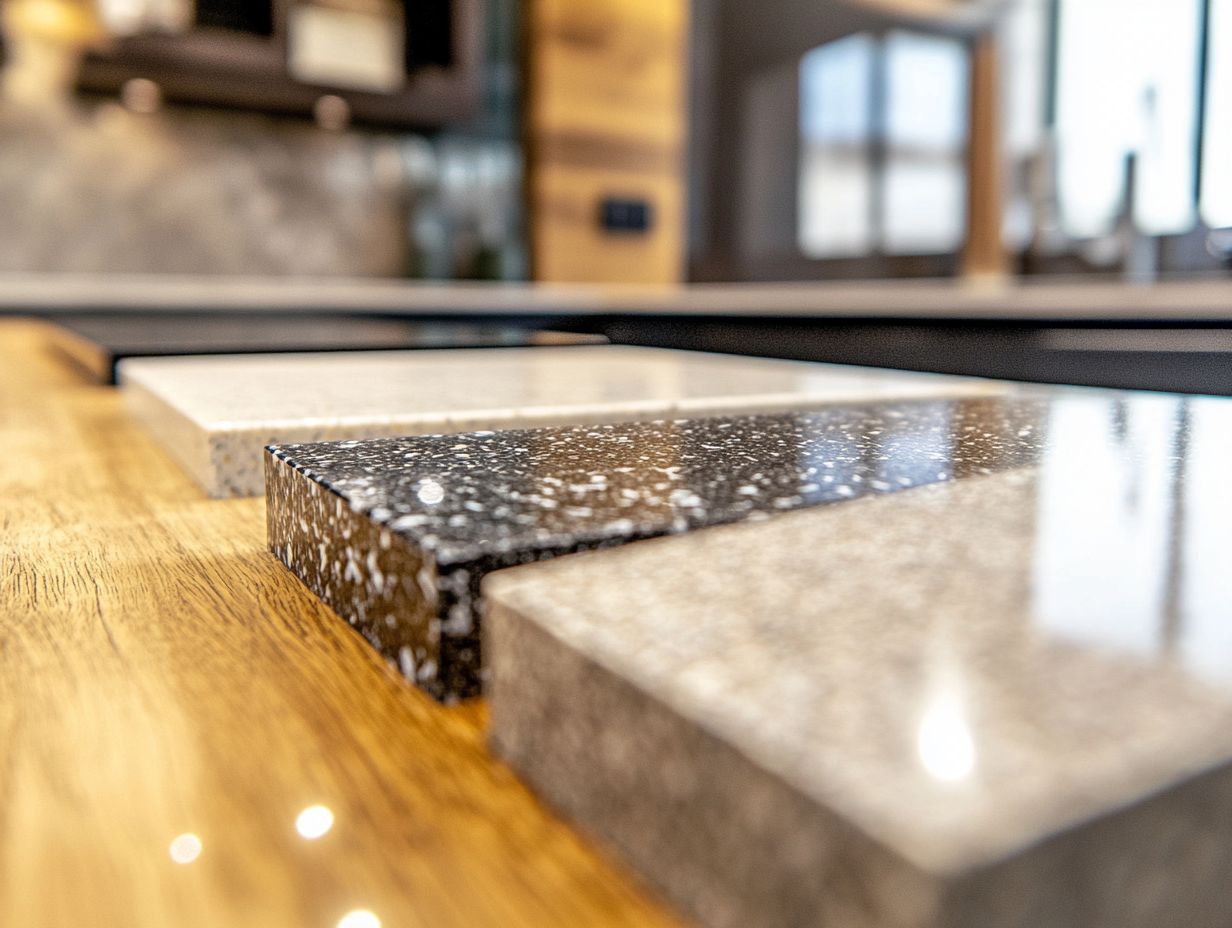
Consider your budget and the longevity of the material when choosing a kitchen counter.
Explore various materials such as granite, quartz, marble, laminate, butcher block, stainless steel, concrete, and tile.
Weigh the pros and cons of each material, focusing on durability, maintenance, aesthetics, and cost.
Factors to Consider Before Choosing a Kitchen Counter Material
Choosing the right kitchen countertop material is crucial and involves several factors. Your budget, style, durability, and maintenance needs all play a role.
These aspects impact your kitchen’s design and functionality. Whether you prefer the elegance of granite or the versatility of quartz, understanding each option’s pros and cons is essential.
This knowledge helps you make a decision that fits your lifestyle and reflects kitchen trends.
Budget and Longevity
Your budget and the material’s longevity are key factors in your countertop decision. Sometimes, a higher initial investment leads to better durability and lower maintenance costs over time.
For instance, granite countertops may require a larger upfront cost, but their durability is a worthwhile investment. They resist wear and tear, making them ideal for those who want both beauty and longevity.
On the other hand, laminate is a budget-friendly option that’s easy to replace but may not hold its value over time. It’s important to consider not just the immediate costs but also the long-term effects on your home’s value.
Ultimately, selecting the right countertop is about balancing a sensible budget with future benefits.
Style and Design
The style of your countertops greatly impacts your kitchen’s overall look. Choosing the right materials can create unique aesthetics and color patterns that reflect your taste.
Whether you opt for natural stone’s opulence or quartz’s modern durability, your choice makes a statement. Each material has its character; for example, natural stone offers timeless elegance while quartz adds durability.
As you select colors, think about how they complement your cabinetry and flooring. A well-chosen color palette enhances visual appeal and showcases your personality, turning your kitchen into a true expression of yourself.
Types of Kitchen Counter Materials
When selecting kitchen countertops, you have many options, each with unique features. Understanding the differences between natural stones like granite and marble versus engineered surfaces like quartz and laminate is essential.
This knowledge enables you to make a choice that aligns perfectly with your kitchen’s needs and your aesthetic preferences.
Granite
Granite countertops stand out as a premier choice. They boast stunning natural beauty, remarkable heat resistance, and impressive stain-resistant qualities.
These countertops offer a durable option for various kitchen designs. Each slab is a unique masterpiece, showcasing an array of patterns and colors that enhance any aesthetic.
Granite surfaces can endure high temperatures, making them perfect for those who love to cook. You have a range of installation options, from DIY projects for the adventurous to professional installations for those who prefer a polished approach.
While granite does require regular sealing to maintain its brilliance, its durability and resistance to scratches give it an edge over alternatives like laminate or solid surface materials.
With the right care, these countertops can last a lifetime, serving as a beautiful and functional focal point in your kitchen.
Quartz
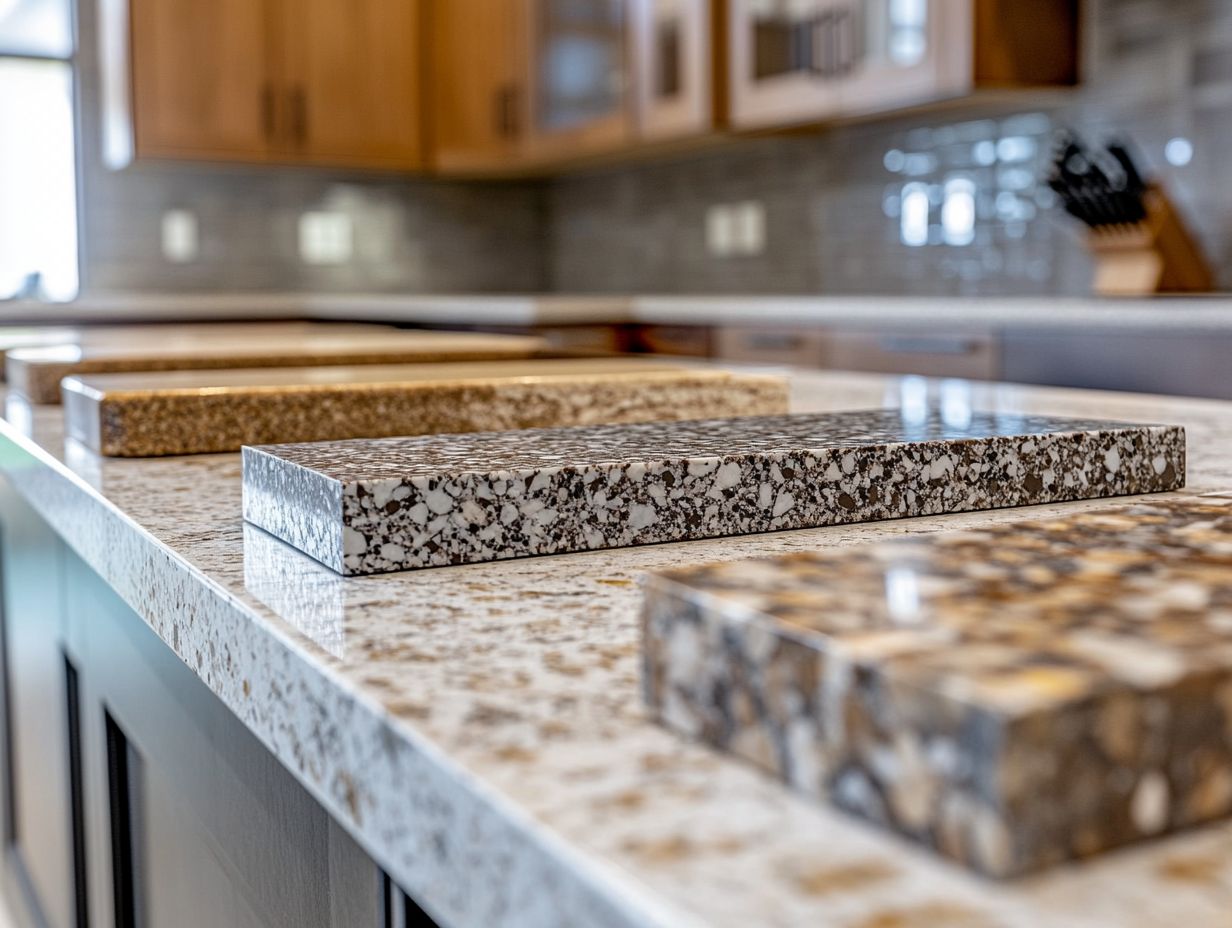
Quartz is a premier choice for kitchen countertops, celebrated for its durability and low maintenance needs. It excels in bustling kitchen environments.
This sophisticated material combines natural quartz crystals and resins, enhancing its strength and offering vibrant colors and stunning patterns.
Quartz countertops don’t require sealing, making them easy to clean and maintain over time. Their non-porous nature means they resist bacteria growth and staining, a crucial advantage in any kitchen.
The seamless combination of practicality and aesthetic allure makes quartz a preferred choice for discerning homeowners and designers alike. It establishes itself as a reliable and stylish option for contemporary kitchens.
Marble
Marble countertops are celebrated for their stunning aesthetic appeal and distinctive veining. However, they are porous materials that demand diligent maintenance to remain in pristine condition.
This exquisite natural stone adds sophistication to your kitchen, making it a favored choice among homeowners and designers. The characteristic patterns and colors can elevate your space, creating an elegant backdrop for culinary endeavors.
However, that porous surface can easily stain if spills aren’t addressed promptly. You’ll need to commit to regular sealing and gentle cleaning.
In your kitchen, marble shines in baking areas due to its cool surface, but alternatives like quartz or granite offer better durability and lower upkeep, making them more practical for high-traffic environments.
Laminate
Laminate countertops present an attractive and budget-friendly option. They are easy to clean and come in a dazzling array of designs and colors.
These surfaces can convincingly replicate the look of more expensive materials, offering a stylish solution that won’t break the bank.
While the affordability of laminate is a major perk, it may not match the durability of natural stones like granite or marble. Engineered stones, such as quartz, provide both visual elegance and superior durability, though they come at a higher price.
Consider these factors: while the low-maintenance nature of laminate is appealing, it may demand more frequent replacement compared to the lasting power of stone counterparts.
Butcher Block
Butcher block countertops bring a warm, inviting wood aesthetic to your kitchen, making them a fantastic choice for food preparation. However, they require regular maintenance to keep them looking their best.
These surfaces provide a robust, forgiving workspace that’s particularly advantageous for chopping and slicing. This results in less wear on your knives compared to harder materials.
One standout feature of butcher block is its remarkable ability to self-heal minor cuts and scratches, which is not just a bonus but a functional perk.
To maintain their attractive appearance and avoid issues like staining or warping, you’ll love keeping them beautiful with regular oiling and careful cleaning. Finding that sweet spot between enjoying the tactile benefits of wood and ensuring its longevity is crucial for anyone considering this countertop option.
Stainless Steel
Stainless steel countertops have become a favorite in modern kitchens. Their sleek appearance, impressive heat resistance, and easy-to-clean surfaces make them a top choice.
They effortlessly combine practicality with style, appealing to both homeowners and chefs. Unlike traditional materials like granite or wood, stainless steel offers a seamless design that enhances various kitchen styles—from industrial to contemporary.
This material doesn’t absorb liquids, preventing stains and stopping bacteria buildup. This ensures a hygienic cooking environment. With remarkable resilience against heat, scratches, and spills, stainless steel countertops thrive in busy kitchens.
Whether you prefer a minimalist aesthetic or want to make a bold statement, stainless steel delivers unmatched versatility. It establishes itself as a premier choice among countertop options.
Concrete
Concrete countertops present a distinct look and the chance for custom installation. This makes them appealing for homeowners who desire both durability and personalization.
You can tailor these surfaces in various colors, textures, and shapes. This allows you to easily integrate them into any contemporary kitchen design while enhancing beauty and functionality.
While concrete’s durability is a major benefit, maintenance is necessary to keep these countertops in pristine condition. Regular sealing is crucial to protect against stains and moisture, which can be challenging.
However, the chance to customize the design and finish adds to their allure. Concrete countertops are a thrilling choice for anyone looking to elevate their kitchen space!
Tile
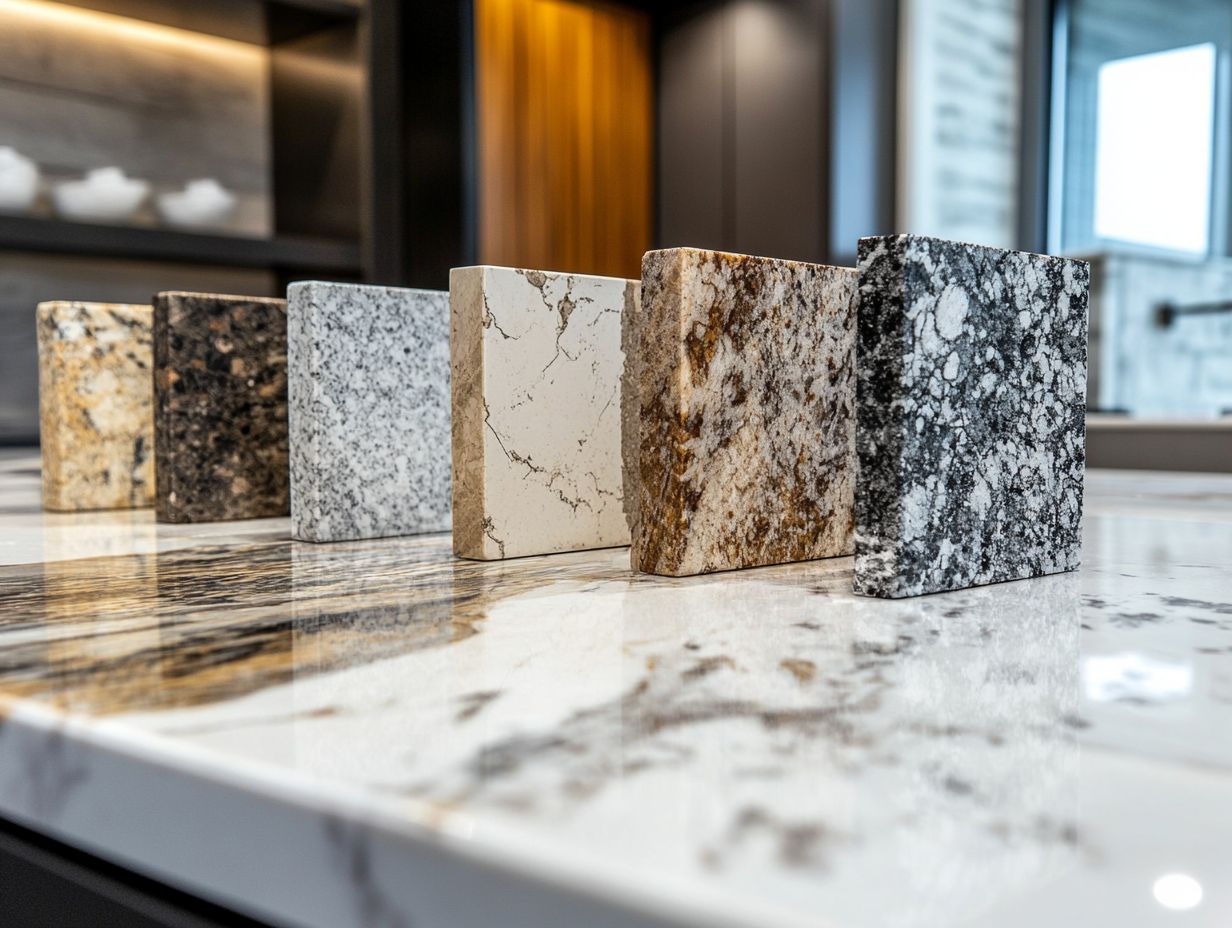
Tile countertops offer remarkable customization and can be crafted from eco-friendly materials. They provide an easy-to-clean surface that adds unique character to your kitchen design.
With an almost endless selection of colors, patterns, and sizes, these surfaces allow you to express your personal style in ways that quartz or granite cannot. Unlike solid surfaces, tile countertops are impressively durable, effectively resisting scratches and heat.
Maintenance is a breeze; often, a quick wipe with a mild cleaner suffices to keep them looking immaculate. Compared to alternatives like laminate or butcher block—both requiring frequent sealing or special care—tile truly shines as a practical and visually appealing option.
Comparing the Pros and Cons of Each Material
When choosing the perfect kitchen countertop, engage in a thorough comparison of available options. Take the time to weigh the pros and cons of each material.
Consider crucial factors like surface durability, maintenance needs, and the overall aesthetics of your kitchen. This thoughtful approach will help you make an informed decision that enhances both functionality and style.
Durability and Maintenance
Durability and maintenance are essential when selecting a kitchen countertop. The material you choose will significantly influence its resistance to heat damage, scratches, and dents, impacting its longevity and performance.
For example, you might deliberate between marble, known for its timeless elegance but infamous for its porous nature and susceptibility to stains, versus more resilient surfaces like quartz, which blend aesthetic appeal with remarkable durability.
Stainless steel is praised for its hygienic properties and ease of cleaning. It offers a sleek, modern touch, though it may develop scratches over time. Each material presents its own challenges, making it crucial to understand how to care for them properly.
For instance, quartz requires minimal upkeep, while marble demands a diligent sealing routine to keep it looking pristine. This highlights the importance of considering your lifestyle in this decision-making process.
Aesthetics and Cost
The aesthetic appeal of kitchen countertops is often the deciding factor as you navigate the balance between achieving a unique look and managing costs. Explore your budget-friendly options available in the market!
In today’s design landscape, the interplay between aesthetics and cost is vital in kitchen renovations. You’re not just looking for visually stunning materials; you also want options that reflect the latest trends without straining your budget.
Consider natural stones like granite. While they can be pricey, alternatives like quartz deliver that same luxurious vibe at a fraction of the cost.
Ever-changing design trends might tempt you toward unconventional finishes, leading you to reconsider your choices. Ultimately, selecting countertops that harmonize visual appeal with affordability is crucial for creating a beautiful yet budget-conscious culinary space.
Factors to Keep in Mind During Installation
When deciding between professional installation and a DIY approach for your kitchen countertops, consider several vital factors.
These include selecting the right materials, ensuring proper sealing, and applying the right finishing methods. Each element plays a role in guaranteeing the longevity and functionality of your countertops, making the decision process all the more significant.
Professional Installation vs DIY
Weighing the options between professional installation and a DIY approach? Consider factors such as cost efficiency, your skill level, and the specific materials involved.
This decision isn’t just about aesthetics; it can significantly influence the overall appearance, longevity, and maintenance needs of your countertops.
For example, materials like laminate and butcher block are often more forgiving for DIY enthusiasts due to their lighter weight and ease of handling. In contrast, granite or quartz generally require expert installation to avoid costly blunders and achieve an impeccable finish.
Hiring professionals ensures precision and durability, but be prepared for a steeper price tag.
Reflecting on the long-term implications for both beauty and upkeep is crucial for creating a kitchen space that is stunning and functional!
Sealing and Finishing
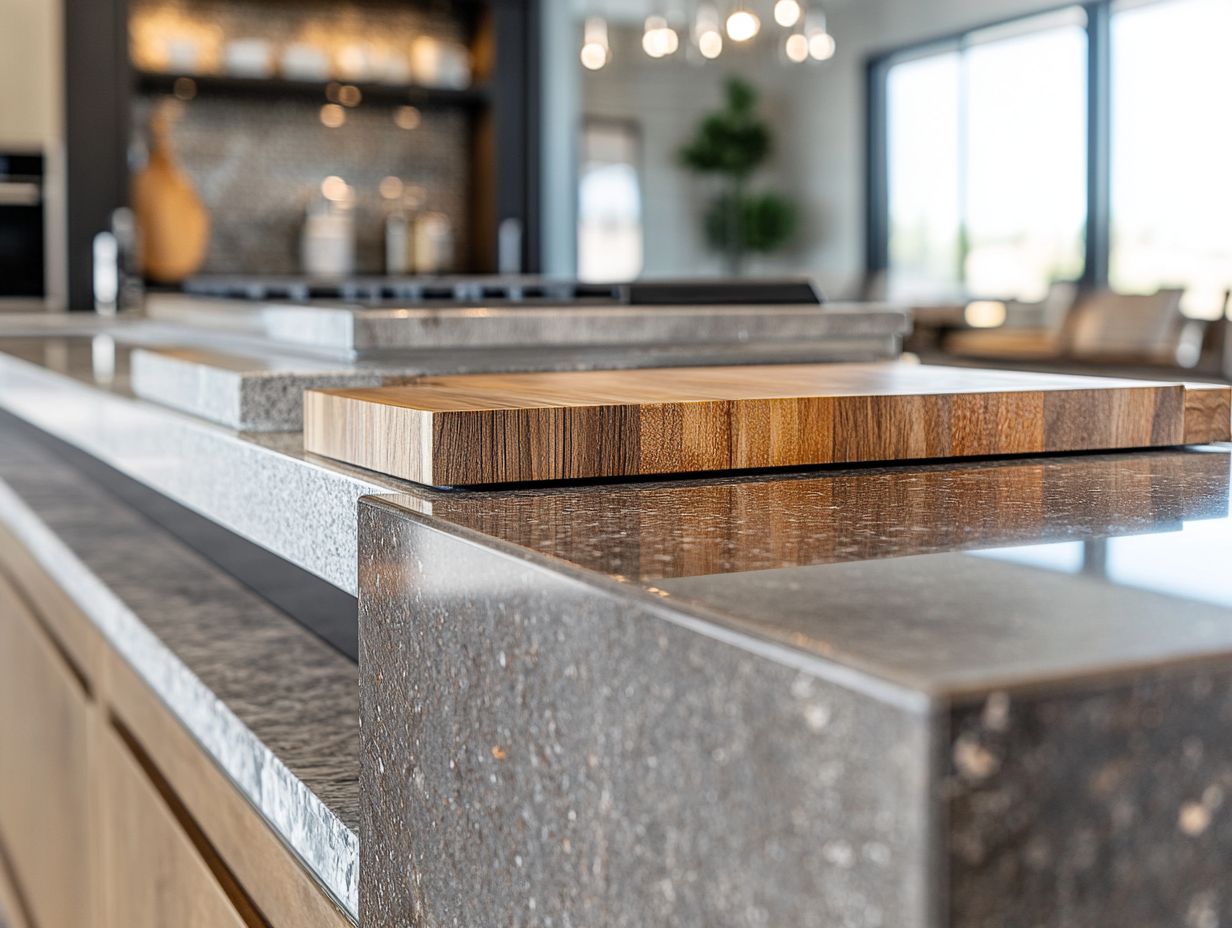
Sealing and finishing are pivotal steps in installing your kitchen countertops. The right treatment can significantly enhance surface durability while protecting against stains, heat damage, and wear over time.
These processes are even more critical for materials like granite, marble, and wood, which are particularly vulnerable to discoloration and damage if left unprotected.
For instance, granite countertops typically require a sealant to prevent moisture from seeping into the stone. Wooden surfaces thrive with an oil finish that maintains their luster and guards against food stains.
By following best practices—such as reapplying sealants every six months to a year based on the material—you can greatly extend the lifespan of these surfaces.
Using pH-balanced cleaners is crucial for preserving the finish and appearance, ensuring your kitchen countertops remain vibrant and can withstand daily use!
Frequently Asked Questions
What factors should I consider when choosing the right material for my kitchen counter?
When choosing the right material for your kitchen counter, consider durability, cost, and maintenance requirements. Also, think about the overall style and aesthetic of your kitchen.
What popular materials are available for kitchen counters?
Popular materials for kitchen counters include granite, marble, quartz, laminate, and stainless steel. Each material has unique characteristics and benefits, so research and compare before making a decision!
Is one material better than others in terms of durability?
Some materials, such as granite and quartz, are known for their durability and resistance to scratches, heat, and stains. However, with proper care and maintenance, most materials can be durable and long-lasting.
Don’t wait—choose the best material for your kitchen today!
How can I determine the cost of materials for my kitchen counter?
The cost of kitchen counter materials varies greatly. Granite and marble are often expensive, while laminate and butcher block are more budget-friendly.
Research and get quotes from various suppliers to find the best price for your chosen material!
Are there any eco-friendly options for kitchen counter materials?
Discover eco-friendly options for your kitchen! Recycled glass, bamboo, and concrete are excellent choices.
These materials are sustainable and have a lower impact on the environment compared to traditional options.
What maintenance is required for different materials?
The maintenance for different materials varies. Some may need sealing or occasional polishing, while others require daily cleaning with mild soap and water.
Research the maintenance requirements for your chosen material to ensure its longevity!
